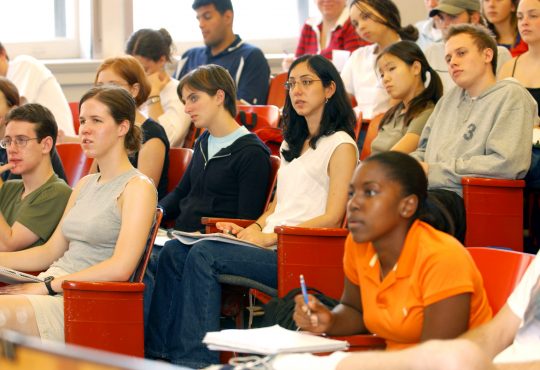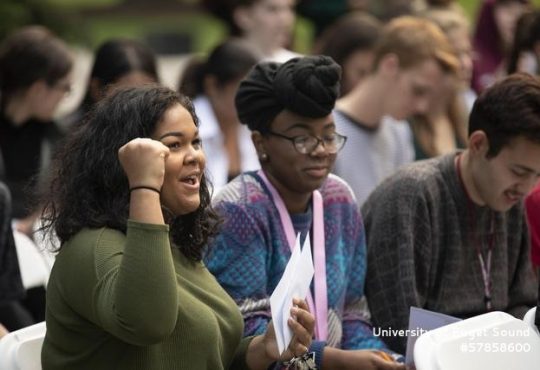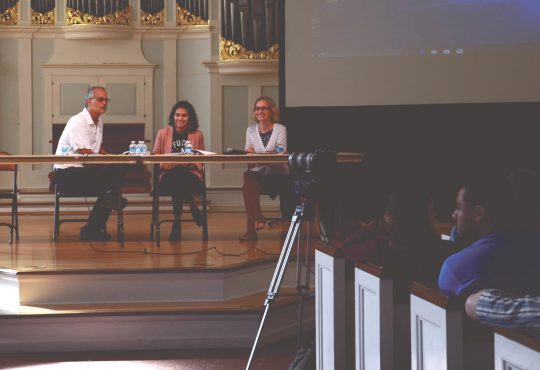In 2011, the year Mariana Molina ‘14 marticulated at the University of Puget Sound, the Undocumented Students Work Group (USWG) delivered policy recommendations to the President’s Cabinet in an effort to combat the various problems that undocumented students face at the University.
Since those recommendations, professors at Puget Sound have begun taking part in developing campus-wide actions.
For instance, Professor Oriel Siu’s Drop the “I” Word campaign event with writer and strategist Monica Novoa was a targeted effort to bring awareness to the dehumanizing effects of calling people ‘illegal,’ an overtly politicized term often used to callously desribe one’s undocumented immigrant status.
“By calling someone ‘illegal,’ or worse, ‘illegal alien,’” Siu said. “We deprive the people we seek to describe of human qualities; we marginalize them as people not belongig here; we also automatically criminalize them.”
In 2014 Molina wrote an article published in The Trail entitled, “A Public Letter to the Faculty and Administration at the University of Puget Sound,” driving the conversation home on the Puget Sound Campus. In that article, Molina outlined her experience as an undocumented student on this campus.
Many of Molina’s experiences were a reflection of the need for the changes recommended by the work group as well as an outline of the lack of progress.
The first recommendation states that the term “undocumented” would be used instead of “non-resident alien.” The change was officially adopted and supposedly applied campus wide.
Molina’s experience said otherwise.
“I’ve spoken to some professors about how a term like ‘illegal alien’ is dehumanizing. They have implied that I should be the one to speak out in class when the term is used,” she wrote.
The burden of defense is placed on the undocumented person, not on the offending name caller.
When asked about the issues brought up in Mariana’s article, Victoria Gavia said that, “It is the responsibility of the professor to mediate a classroom conversation and ensure a mutual respect during discussion despite disagreement. The use of the word ‘illegal’ automatically violates this respect regardless of who is in the room. Students who are in the shadows depend on educated professors to set an example of humanity – this can be as simple as word choice.”
Molina, and other people like her, felt that they did not have the faculty on their side.
Czarina Ramsey, Director of Intercultural Engagement, said that this ignorance and callous use of language “leads to a painful isolating moment that further removes the student from feeling a connection at Puget sound.”
Unfortunately, the USWG lists no faculty allies that undocumented students can seek out support from.
Professor Siu is one of many people from Central America who has faced forced migration to the United States due to war and unfavorable or outright dangerous social, political and economic conditions.
When Professor Siu was asked about her experience working with undocumented students at Puget Sound, she said that, “Learning of Molina’s experiences on campus made it clear to me that despite current and past institutional efforts to build a more inclusive Puget Sound community, our university still fostered macro and micro spaces of exclusion, silenging and marginalization for a student like Mariana.”
She emphasized the work that lies ahead in “helping [to] build truly safe-spaces where silenced experiences can be heard and made visible so that students living the shadows of undocumentation may feel free to come out with fear.”
Molina’s experience was reflective of the need for that.
Given the University’s policy of offering full financial aid packages to undocumented students (i.e. substituting federal or state funds with private funds) and various support networks, some deem the university friendly to undocumented students.
Others still, like Molina, refute that claim.
“I always wondered why they didn’t give us a group or something… I met one other undocumented girl my senior year, we got really close because we understood each other. It sucked that it took me so long to meet her, but it would have been nice to know who the other undocumented members of the student body were,” said Molina.
Indeed, many universities around the nation have created groups that support undocumented students on campus.
UC Davis, for example, has created an Undocumented Student Center, a community house on campus where undocumented students can come together, share their experiences, and gain access to tools to help them overcome financial burdens and succeed academically and socially.
UC Berkley also has an Undocumented Student Program that offers not only support for undocumented students, but also support for heir parents with paying for college and ways to connect with other undocumented students.
It should be appreciated that, given security reasons, the USWG recommended that individuals should not be identified.
Some of the Work Group’s recommendations have the potential to create a more welcoming environment for Puget Sound. The recommendation to use culturally relevant images in reading materials would help undocumented students feel comfortable and welcome in their classes, and legitimize their lived exerience. However, as of yet, there has been no significant action towards applying this reccomendation.
The Work Group also recommended allowing the opportunity for undocumented students to be able to live off-campus. Petitions for undocumented students to live off-campus will be seriously considered by Deborah C. Chee, Director of Residence Life, and Mike Segawa, Dean of Students, but there is no guarantee that permission will be granted.
CES has also taken some of the recommendations made by the document by attending a webinar last summer to learn how to assist undocumented students in college and beyond. However, it is noteworthy that it only occured four years following the publication of the recommendations in the USWG.
The amount of time that thas passed without further developments regarding the recommendations illustrates not only a staggering lack of progress, but also the isolating indignities that many undocumented students continue to endure at Puget Sound.
Mariana Molina is but one of many undocumented students who have attended the University of Puget Sound. In her exerience, she is not alone. There is much work to be done.
Despite complex legislation and convoluted discussions regarding legal processes and applications, the simplest sign of progress is knowledge.
Professor Siu, for one, is hopeful that we can make substantial progress, “[b]y informing ourselves and tearing down the walls of ignorance surrounding and traversing the issue; by not being afraid to openly discuss the larger issues surrounding the reality faced by more than 12 million undocumented people living in the US.”




